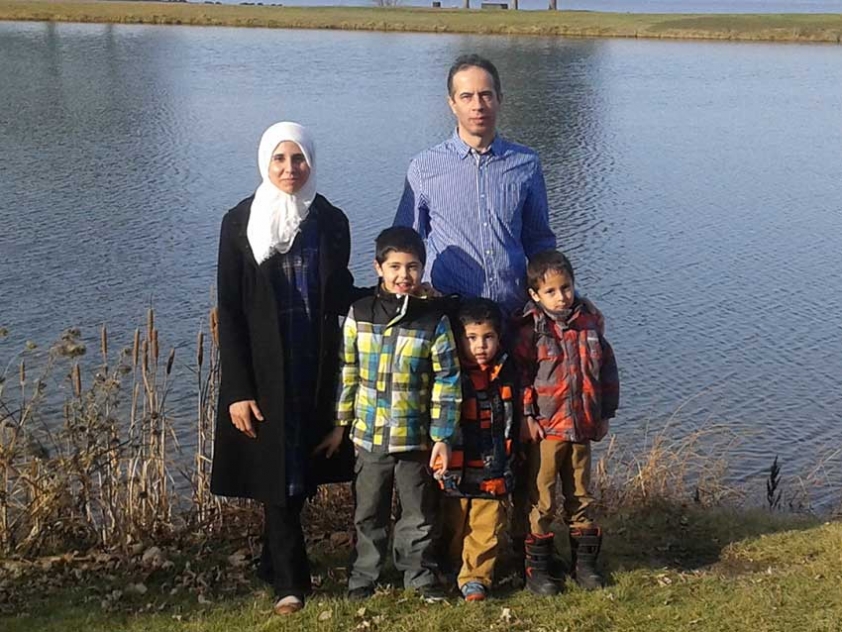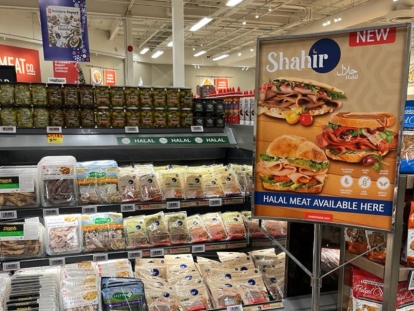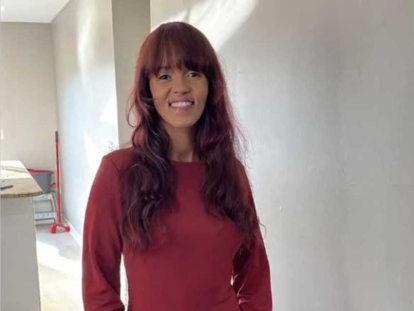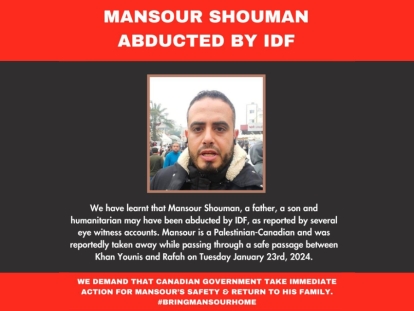 Dima Siam, her husband Mohammed Al Rayyan, and their children.
Courtesy of Mohammed Al Rayyan
Dima Siam, her husband Mohammed Al Rayyan, and their children.
Courtesy of Mohammed Al Rayyan
Mar
Ottawa Mother Facing Deportation to Syria Asks For Community Support
Written by Chelby DaigleMuslim Link had the opportunity to interview Mohammed Al Rayyan and his wife Dima Siam, who is facing deportation to Syria. A petition was launched on March 8th, International Women’s Day, demanding that the new Minister of Citizenship and Immigration, John McCallum, grant Dima permanent residency. Dima hopes that members of Ottawa's Muslim community would consider supporting her cause and signing the petition.
Although no deportations are being processed to Syria at this time, Dima has no status in Canada, where she lives with her husband and three children, all Canadian citizens, in Ottawa’s West End. Her family’s plight has made headlines in mainstream English and French language media for over a year.
The Canadian Border Services Agency (CBSA) seized her Syrian passport, which expires on March 12, 2016, and for the past year, she has had to report monthly to the CBSA office, like others in the city who are facing deportation, although recently, in a show of leniency, she has been told she only has to report to them every six months. As soon as her passport expires, she will be left without status in any country.
Despite having arrived in Canada in November 2012, and being a refugee twice offer, first as a stateless Palestinian living in Syria, and now having fled Syria because of the civil war, she is not considered a refugee in Canada. While over 25,000thousand Syrian refugees have arrived in Canada over the past three months and have been granted Permanent Resident status with access to health care, education, and work permits, Dima has no health card and no right to work or study here.
How did this happen?
Mohammed Al Rayyan and Dima Siam met while he was visiting his family in Syria in 2007. Both lived in Yarmouk Camp outside of Damascus. The camp is home to hundreds of thousands of stateless Palestinian refugees in Syria. Mohammed, who, while living and working in Canada as an IT Systems Engineer became a Canadian citizen, decided to stay in Syria and marry Dima, a teacher with degrees in biology and education.
Life was good and the couple had two children by the time the civil war broke out in Syria. In 2011, Mohammed started receiving calls from the Canadian Ministry of Foreign Affairs, asking that he voluntarily evacuate the country with his wife and children. “They called us many times,” Mohammed explained, “One time someone from Canadian Embassy in Turkey was on the phone with us and he could hear the bombing in the background. He urged us to leave.” After the birth of their third child, with violence in Damascus escalating, Dima and Mohammed decided to leave for Canada. The Canadian government granted Dima a visitor’s visa so she could come to Canada with her husband and children who all had Canadian citizenship.
But Mohammed worried about what life would be like for this family when he arrived back in Ottawa. “I didn’t want to come here to starve because you don’t know if you are going to get a job,” he shared. After arriving in November 2012, he had to make a difficult decision. “We had no money. We spent what we had on the plane tickets to come here. I had to go on social assistance. That was the first time ever since I first arrived in Canada in April 1999.”
But alhamduillah (thank God), Mohammed soon found a job so he was able to get off of social assistance after three months. He decided to fill out the paper work to apply to sponsor Dima. “I sent my application to sponsor my wife on January 15, 2013, the same day I started a job as an IT Systems Engineer. At the time, I remained on social assistance to tide us over until I received my first pay cheque one month later. Without this assistance, I would not have been able to support my family’s most basic needs. I attached a copy of the job offer on the original sponsorship application. I figured it would take some time for the application to be considered, and I honestly believed that by the time Dima Siam’s application was being considered, it would be long past the time when I ended my time on social assistance. So, when asked on the application if I was on social assistance, I wrote No.”
This mistake would have serious consequences.
On September 5, 2014, 21 months after he submitted the sponsorship application, Dima Siam and Mohammad attended an interview with a Citizenship and Immigration (CIC) officer, where it was brought to their attention that Mohammed had made a mistake on the application. According to Mohammed, after this interview he was called by the CIC officer and then a City of Ottawa officer and they presented him with two options: withdraw the sponsorship application for Dima and resubmit a new one, or pay back the social assistance he received if he wanted to move forward with getting Dima permanent resident status. He chose the second option, and subsequently received from the City of Ottawa an overpayment letter based on the CIC officer’s request. Although he disagreed with what he saw as an exaggerated calculation of what he owed and corresponded with CIC and City of Ottawa to correct this, he eventually made full payment on January 9, 2015.
Despite paying back the social assistance to meet CIC’s requirements, on January 29, 2015, CIC rejected the sponsorship application stating that “Sponsor being on social assistance on the day the application was submitted.” A deportation order for Dima to Syria was included with the sponsorship decision. Mohammed was shocked as he had believed that the purpose of making the payment back to the City of Ottawa was to resolve this issue.
Since then, Dima’s case has made headlines in mainstream media and Mohammed has been fighting to get his wife some status in Canada. He went to media, his local MP, John Baird at the time, and Dima got a letter of support from Amnesty International.
In February 2015, Dima and Mohammed worked with immigration consultant Mr. Rami Alsaqqa to submit a Pre-Removal Risk Assessment (PRRA) for Dima to the Immigration and Refugee Board (IRB). If her PRRA was approved, it was hoped Dima would be recognized as a refugee and could eventually receive permanent residence. Mohammed kept trying to find out the status of Dima’s PRRA but wasn’t getting answers from IRB.
The uncertainly of Dima’s situation has severely affected her mental health. “I am depressed,” Dima explained with the help of an interpreter*, “I expected to come here and be able to start studying and working. But I can’t get a health card, I can’t study, I can’t work, I can’t do anything. I am living in constant fear of having to go to the hospital and not being able to cover the costs.” Because of lack of status, Dima can’t even teach at her children’s weekend Arabic school or attend the ESL classes offered right in her neighbourhood.
Dima’s depression became so severe that Mohammed took her to Pinecrest-Queensway Community Health Centre for support. While waiting for her, Mohammed passed out. “I took her there because she was depressed. But I didn’t realize that I was also depressed. I ended up collapsing and they took me to the hospital,” he shared. All of the stress of battling with Citizenship and Immigration, the Immigration and Refugee Board (IRB) and CBSA, while working full-time and supporting his family had taken its toll on Mohammed’s health.
The Health Centre was so concerned for the family that they contacted the Ottawa Community Immigration Centre (OCISO) who put them in touch with Connecting Ottawa, which offers legal services for immigrants. A refugee lawyer there wrote to IRB outlining, including medical documentation, the extent to which the way the family was being treated was impacting their mental and physical health.
After the election, the family saw a chance for their situation to be finally resolved. Their new MP, Anita Vandenbeld, and her staff, has been much more supportive than their previous representative. “We are very lucky to have her,” Mohammed explained, “We have met her many times. The people in her office are very good people and they are trying to do their best. They started to inquire about the file.”
It was through the investigation of MP Vandenbeld’s office that Dima and her family were struck another devastating blow when it was discovered that the Pre-Removal Risk Assessment (PRRA) which had been submitted for Dima a year ago and which could have led to her being recognized as a refugee, had not been processed by IRB at all.
According to CBSA, there is no reason to process Dima’s PRRA because they are not deporting people to Syria until the conflict is resolved. So this entire time, no progress has been made in her case. Dima and Mohammed have been further frustrated and depressed by the government’s decision to leave Dima without status in the country for years to come.
“I can’t imagine that we can survive anymore living in this situation,” Dima explained, “We are tired and sick. There doesn’t seem to be any hope. Even though our MP Anita Vandelbeld has been supportive and everyone is telling us that this new government is better than the old one, I haven’t seen any change in my situation yet.”
Mohammad and Dima hope that members of Ottawa’s Muslim community and advocates for social justice will take action to help resolve her situation so she can become a permanent resident and get on with building a life in Canada with her family.
“We would like to see solidarity and some kind of public action. Write or Call your MP and ask them to do something about this,” Mohammed explained. “I would like to see more community support and to have people raise awareness about this issue,” Dima said.
Both Dima and Mohammed are grateful to immigration consultant Mr. Rami Alsaqqa, to MP Anita Vandenbeld and her office staff for their support, and for the actions of Matthew Behrens, a Perth-based social justice activist, who launched a petition advocating that Citizenship and Immigration grant Dima permanent residency and consider similar cases of people displaced by the Syrian civil war living in Canada. But they would like to see similar actions taken by more people, particularly by their fellow Muslims, who they are seeing being so welcoming and supportive of newly arrived Syrian refugees.
“Dima should at least be given the same status that other Syrian refugees now arriving are receiving,” Mohammad said, “It makes sense, doesn’t it?”
To support Dima, sign this petition.
To view a video of Dima's son Anas asking Canadians to support his mother, visit
.*Thank you to Assma Basalamah for her interpretation.
This article was produced exclusively for Muslim Link and should not be copied without prior permission from the site. For permission, please write to info@muslimlink.ca.






